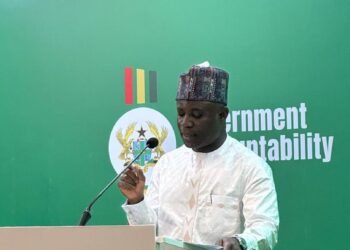The Ministry of Roads and Highways has officially announced the government’s decision to reintroduce road and bridge tolls across the country as part of efforts to generate revenue for road maintenance and infrastructure development.
The reintroduction of tolls, according to the Ministry, will come with a modern, technologically-driven collection system aimed at ensuring efficiency and transparency.
In a press release dated February 6, 2025, and signed by the Head of the Public Relations Unit, Nasir Ahmadyartey, the Ministry assured the public of its commitment to implementing an improved tolling system that effectively addresses the funding challenges for road maintenance.
To ensure the seamless execution of this initiative, the Ministry emphasized that an open, transparent, competitive, cost-effective, and fair procurement process would be adopted in selecting service providers for the toll collection system.
This decision marks a significant shift from the previous administration’s stance on toll collection.
The then-Minister of Roads and Highways, Hon. Kwasi Amoako-Attah, under the New Patriotic Party (NPP) government, controversially suspended road tolls in November 2021.
The move, justified at the time as a measure to ease vehicular congestion and reduce inefficiencies, led to considerable debate over its legal basis and economic consequences.
Implication of Road Tolls Suspension
At his vetting as the new Minister for Roads and Highways, Hon. Governs Kwame Agbodza strongly criticized the suspension of road tolls, describing it as an illegal act that undermined Ghana’s legislative framework.
He argued that the tolls were a legally mandated source of revenue under the Road Fund Act, and thus, their suspension without parliamentary approval constituted an unlawful breach.
“For me, it was an act of illegality. They said they just zeroed it. But it was a road fund and has got an Act. It’s a law. So, you couldn’t unilaterally do that. As a result, I believe there was some level of negligence in the way it was done”.
Hon. Governs Kwame Agbodza
He further highlighted the financial shortfall resulting from the abrupt suspension of the tolls, emphasizing the critical need for sustainable revenue generation for road maintenance.
Hon. Agbodza reiterated that the National Democratic Congress (NDC) had always maintained a firm position on the necessity of road tolls to ensure a steady stream of funds for infrastructure upkeep.
“Our side consistently stood on principle and said bring the road toll back. Yes, the road toll is coming back but not in the form of building obstructions on the road for drivers to stop and somebody taking money from them”.
Hon. Governs Kwame Agbodza
To address past inefficiencies and concerns about corruption, Hon. Agbodza assured the public that the new system would be technology-driven.

The introduction of an automated and digitized toll collection system, he explained, would make the process more transparent, fair, and easier to monitor.
“It will be coming back based on a technological platform that makes it fair and that makes it easy to collect, easy to account for, and for the public to know what the money is actually being used for”.
Hon. Governs Kwame Agbodza
The Minister had further indicated that the government would soon unveil a comprehensive policy detailing the modalities of the reintroduced tolling system. “Together with the road minister, we shall come out with a policy as to how that will be done,” he affirmed.
While some citizens and road users may welcome the move as a necessary step towards improving road conditions, others may be sceptical about its execution, particularly regarding the fair utilization of funds generated.
Many Ghanaians have expressed deep concerns over the collection of road tolls in the past, including concerns about revenue leakages, lack of accountability, and the poor state of roads despite years of toll collection.
The promise of a modernized system is expected to address these concerns by ensuring efficiency, preventing revenue losses, and enhancing public confidence in the use of toll proceeds.
As the government moves towards reintroducing tolls, transparency, accountability, and efficiency will be key factors in determining public acceptance.
The commitment to a fair and competitive procurement process, as well as the adoption of digital tolling technology, will be crucial in ensuring that the reimplementation of road and bridge tolls achieves its intended objectives.
With Hon. Agbodza’s strong stance on responsible revenue generation and infrastructure development, Ghanaians will be looking forward to the details of the new policy and how it will impact road users, contractors, and the overall road maintenance system.
READ ALSO: Trump’s USAID Shutdown Sparks Global Humanitarian Crisis




















